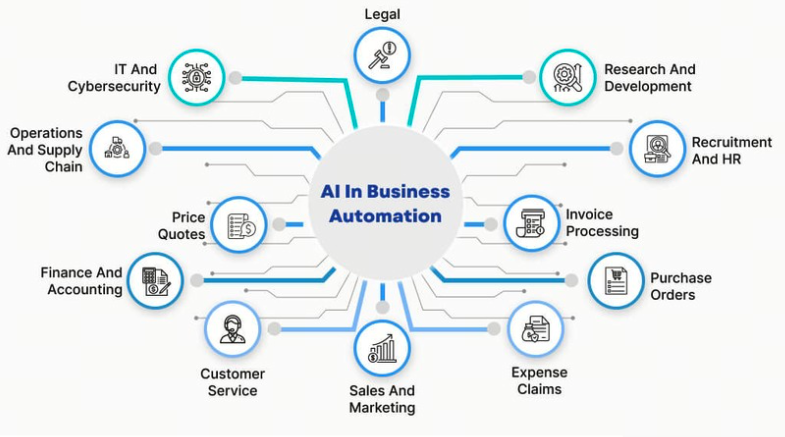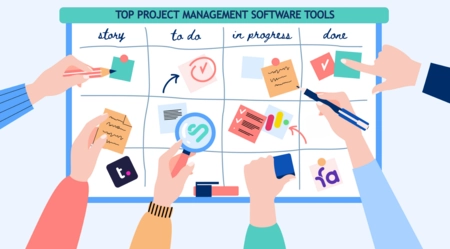
What Are AI Automation Tools?
AI automation tools are software applications powered by artificial intelligence designed to perform tasks traditionally carried out by humans. These tools use machine learning, natural language processing, and data analytics to automate repetitive tasks, improve decision-making, and enhance overall business operations. By integrating AI into processes such as customer service, marketing, HR, and data analytics, companies can achieve significant cost savings and operational efficiency. AI tools are also capable of learning from data patterns, meaning they can continuously improve over time, offering businesses more sophisticated automation solutions.
1. AI for Customer Service Automation
Customer service is a key area where AI-powered automation can have an enormous impact. Chatbots and virtual assistants are becoming more sophisticated, allowing businesses to provide 24/7 support without additional human resources. Leading tools in this area include:
- Zendesk AI: Automates ticket routing, response suggestions, and customer query handling.
- Intercom: A customer support platform with AI chatbots that can assist customers in real-time.
Key Benefits:
- Instant response time for customer queries.
- Reduction in human error and operational costs.
- Scalability in customer service operations.
2. AI for Sales and Marketing Automation
In 2025, businesses are increasingly leveraging AI to automate their sales and marketing processes. AI tools can analyze data, segment audiences, and deliver personalized marketing campaigns that are more effective than traditional methods. Here are the top AI tools for sales and marketing automation:
- HubSpot AI: Uses machine learning to analyze customer data and automate lead generation, segmentation, and email marketing campaigns.
- Marketo: Offers AI-driven marketing automation for customer lifecycle management, helping businesses target the right audience at the right time.
Key Benefits:
- Personalized marketing that increases conversion rates.
- Automated lead nurturing and scoring.
- Improved ROI through data-driven strategies.
3. AI for Human Resources Automation
The role of AI in human resources has grown significantly, helping businesses with everything from recruitment to employee engagement. AI tools for HR can assist in screening resumes, scheduling interviews, and managing employee data. Top tools include:
- Workday AI: A comprehensive HR platform that automates employee data management, payroll, and recruitment processes.
- HireVue: Uses AI to screen job applicants by analyzing video interviews and predicting their potential success within the company.
Key Benefits:
- Streamlined recruitment processes.
- Reduced time spent on manual HR tasks.
- Improved employee engagement through AI-driven insights.
4. AI for Financial Automation
AI in the financial sector has brought about major improvements in managing budgets, forecasting, and financial decision-making. Tools like:
- Xero AI: Automates bookkeeping tasks, reconciles bank accounts, and generates financial reports.
- QuickBooks AI: An AI-driven tool that helps automate invoice generation, payroll, and expense tracking.
Key Benefits:
- Error-free financial management.
- Faster reporting and analytics.
- Improved compliance and tax management.
5. AI for Supply Chain Automation
Supply chain management can benefit significantly from AI, which enables companies to forecast demand, optimize inventory levels, and improve logistics. Leading tools in this area include:
- Llamasoft AI: Uses machine learning to optimize supply chain networks, predict demand, and reduce waste.
- Blue Yonder: A platform that leverages AI to predict and automate inventory management, improving stock levels and customer satisfaction.
Key Benefits:
- Better demand forecasting and inventory management.
- Improved logistics and delivery times.
- Reduced operational costs and waste.
6. AI for Data Analytics and Decision-Making
AI is transforming how businesses make data-driven decisions. Business intelligence (BI) tools are now incorporating machine learning to deliver predictive insights and help decision-makers make informed choices quickly. Some of the top AI tools for analytics and decision-making are:
- Tableau AI: A powerful BI tool that uses AI to create visual reports and offer predictive analytics based on business data.
- Power BI with AI: Microsoft’s Power BI integrates AI to help users discover insights and automate data reporting.
Key Benefits:
- Enhanced decision-making through predictive analytics.
- Data-driven insights in real-time.
- Automation of routine data tasks, freeing up time for strategy.
Chart: Top AI Tools for Business Automation in 2025
| Category | AI Tool | Key Feature |
|---|---|---|
| Customer Service | Zendesk AI | Automates ticket routing and customer query handling |
| Sales & Marketing | HubSpot AI | Automated lead generation and email marketing |
| Human Resources | Workday AI | HR management, payroll, and recruitment automation |
| Financial Management | QuickBooks AI | Invoice generation, payroll, and expense tracking |
| Supply Chain | Llamasoft AI | Demand forecasting and supply chain optimization |
| Data Analytics & Decision-Making | Tableau AI | Predictive analytics and data visualization |
Conclusion
In 2025, the best AI tools for business automation span a variety of sectors, from customer service to financial management, helping businesses save time, reduce costs, and improve operational efficiency. Whether you're looking to automate your HR processes, enhance your marketing automation, or streamline your supply chain, there are AI-powered tools that can help your business thrive in a competitive market.
By integrating the right AI tools into your business, you can unlock the potential for growth and innovation, ensuring long-term success in an increasingly automated world.



